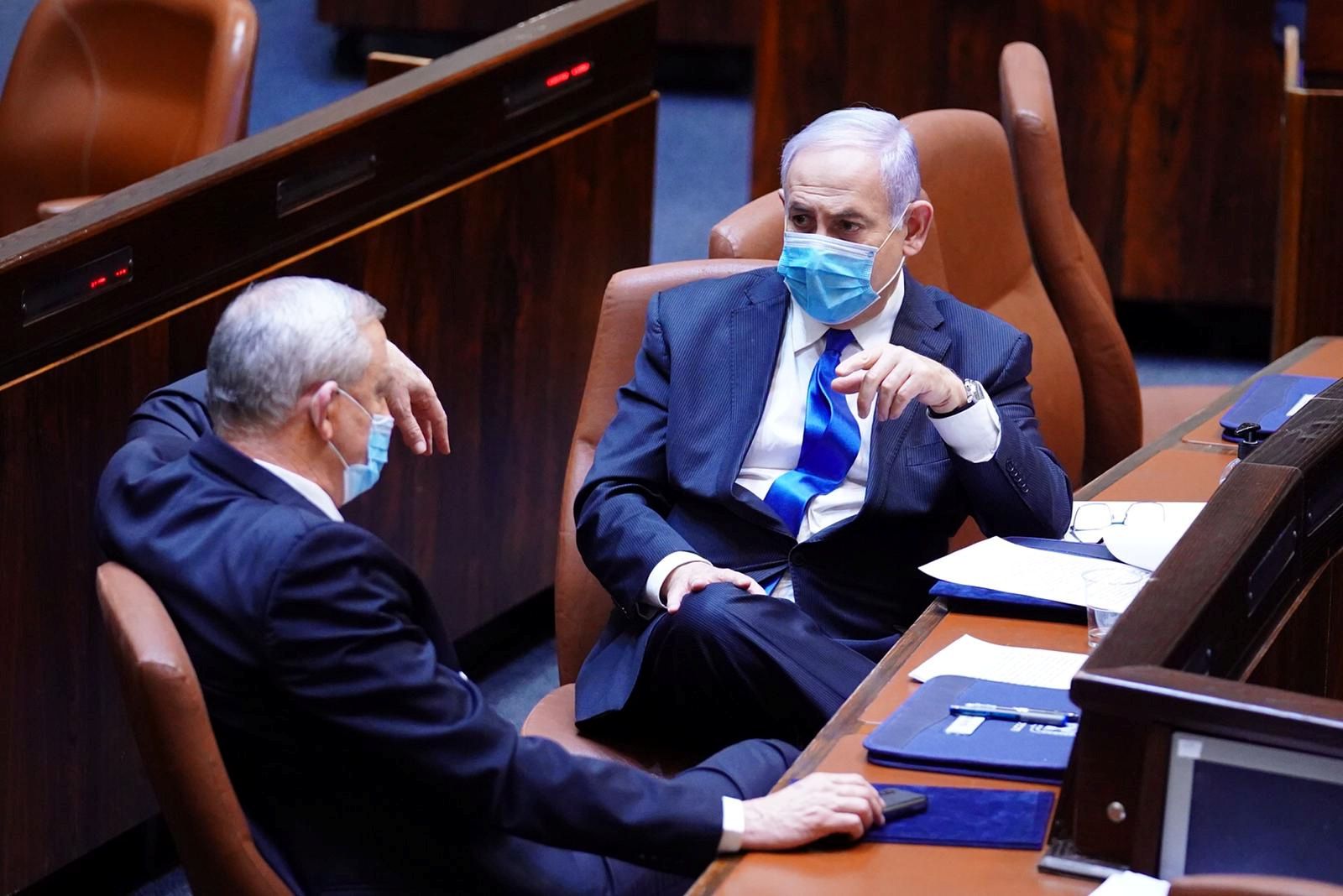Breaking the Deadlock: Unity Government in Israel

Post-Election Situation
The Knesset elections held on 2 March—the third in less than a year—did not provide a clear victory for any of the political blocs. PM Netanyahu’s Likud and right-wing religious parties obtained 58 seats while the opposition led by Blue and White took 62. The latter’s leader, Gantz, received a mandate to form a government on 11 March.
Initially, Gantz planned the creation of a minority government with external support from the Joint List, an alliance of Arab parties whose political position precludes participation in government. However this option was rejected by three MPs from Gantz’s bloc. In view of the impossibility of gathering a majority, the scenario of a fourth election—in which polls had given Likud the advantage—was becoming realistic. The additional context is the COVID-19 pandemic in Israel and a constitutional crisis in the Knesset after its speaker did not convene a vote on his replacement despite a decision by the Supreme Court (which acts as the constitutional court in Israel).
As a result, Gantz changed his position on cooperation with Netanyahu and on 26 March announced he wanted to establish a unity government with Likud. Other leaders of the Blue and White parties, Yesh Atid and Telem, refused to join. This caused a split in the Blue and White faction—with Gantz’s Israel Resilience remaining—and in other opposition parties joining the Likud bloc. The appointment of the government was delayed by negotiations regarding a coalition agreement between Netanyahu and Gantz about government policies, which required a number of changes in constitutional legislation. On 30 April, the Supreme Court referred to this issue and the fact that an indicted PM was forming a government (Netanyahu took over the mandate from Gantz). The court pointed out the need for changes in planned amendments but unanimously ruled that, despite the formal charges against him, Netanyahu can form a government.
Political Scene
The coalition of 73 seats consists of Likud, religious parties Shas and United Torah Judaism, Blue and White (Gantz kept the name), and four smaller parties with one or two MPs. The agreement between Likud and Blue and White assumes the functioning of a unity government for three years (with a one-year extension possible) with a mid-point change in prime minister. Netanyahu will hold it for the first 18 months and Gantz will take over for the remaining period. Both men will officially be the “alternate PM”. The Gantz bloc will receive the same number of ministries as the rest of the coalition (18 of 36), including defence, foreign affairs, and justice. The coalition agreement includes clauses designed to guarantee—on the threat of automatically triggering new elections—that the parties comply with its provisions.
Gantz’s decision to join Netanyahu in government sparked a crisis in the opposition. After their departure from Blue and White, Yesh Atid and Telem have a total of 16 votes. It is possible that they will unite with Avigdor Lieberman’s party Yisrael Beiteinu (seven seats) and strengthen the secular right-centrist bloc. The second most powerful group in opposition is Joint List (15 seats). The left-wing alliance Labour Party-Gesher-Meretz fell apart, with only four MPs remaining in opposition. The national-religious Yamina has joined the opposition but announced support for the government in certain matters, such as annexation of settlements in the West Bank. Yair Lapid, the head of Yesh Atid, will most likely become the leader of the opposition (an official state function).
Challenges to the New Cabinet
According to the coalition agreement, the priority in the first six months will be countering COVID-19 and restarting the economy. The establishment of the government stabilises the functioning of the state and unlocks decisions delayed by the extended elections cycle, including the adoption of the budget and nominations in the administration. At the same time, the provisions of the coalition agreement force consensus between Likud and Blue and White on most nominations. To avoid disputes, there probably will be no changes to constitutional legislation. The presence of a moderate party in the government will help stop the reforms pushed by the previous Netanyahu cabinet affecting the judiciary. However, tensions between the government and the judiciary will be inevitable due to Netanyahu’s corruption trial, postponed by the pandemic to 24 May.
Netanyahu will remain a key stakeholder in Israeli foreign policy, which negatively affects the chances of improving relations with the Palestinians. The axis of international activity of the new government will be the issue of the announced annexation of Jewish settlements in the West Bank, based on the Trump Peace Plan. Netanyahu is guaranteed in the coalition agreement the right to submit his decision on annexation to a plenum of the government or parliament after 1 July. The probability of annexation is increased by the support for it among most political forces in Israel and the position of the Trump administration. U.S. Secretary of State Mike Pompeo stated in April that the decision regarding the future of the West Bank is Israel’s to make. At the same time, the U.S. emphasizes that any changes to the status quo in this area should take place as part of the Israeli-Palestinian negotiations.
The declarations in this regard by Israeli authorities were met with sharp criticism from the Palestinian Authority (PA) and other countries in the region. The Arab League described the plans as “war crimes”, and Jordan noted that even limited actions (e.g., annexation of the Jordan Valley) would mean a collapse of the peace agreement with Israel. Diplomatic efforts to prevent Israel from breaking international law have been undertaken by the EU, including initiating a debate in the Foreign Affairs Council on possible sanctions in the event of annexation. However, there is a visible lack of EU consensus due to the attitude of individual members, primarily Hungary.
Conclusions
The establishment of the unity government is a significant success for Netanyahu. It allows him to continue ruling with a stable majority despite the prospects of a multi-year trial for corruption while minimising the threat from his most serious political competitor in years, due to the distant date of the change of PM. On the one hand, the coalition agreement indicates the great distrust between Likud and Blue and White, and Netanyahu’s resistance to limiting his influence, which may be a source of future conflict. On the other hand, it strengthens the consensus nature of the new cabinet and stabilises it in the face of repeated political crises. The decision to create a government is supported by 62% of Israelis, including 80% of Likud voters and 57% of Blue and White’s. Counteracting economic weakness and fighting a possible second wave of COVID-19 will have a decisive impact on the government’s reception.
After Gantz’s decision to join the government, the opposition lacks a leader who can be an attractive alternative to Netanyahu. Joining the PM despite his earlier promises has meant a loss of credibility in the country’s political elites in the eyes of some liberal and centrist voters. The opposition would be strengthened by an agreement with the Joint List, but this is unlikely given the current composition of the Knesset. Gantz’s turn-around and the attitude of opposition MPs are a signal that Arab parties—and indirectly their voters—are not an equal partner for most of the Israeli political scene.
The new government’s decision on annexation of the West Bank will have an impact on Israel’s international stance. It would be politically difficult for Netanyahu to postpone it due to high internal support, earlier statements, and backing from the Trump administration. At the same time, annexation would violate international law and result in an outbreak of Palestinian protest, the dissolution of relations with the PA, and a breakdown in normalisation with Arab states. The risk of open conflict with the Palestinians is particularly dangerous for Israel in the context of the COVID-19 pandemic and the expected global recession.
A new government with moderate political forces creates an opportunity to improve Israel-EU relations, for example, in cooperation against COVID-19. However, the issue of annexation will have a key impact on relations. The EU—Israel’s main trading partner—has economic and diplomatic tools that might influence a revision of the Israeli plans. The effectiveness of the EU countermeasures would be strengthened by joint initiatives with members of the Gulf Cooperation Council (UAE, Bahrain), relations with whom Israel is particularly interested.





